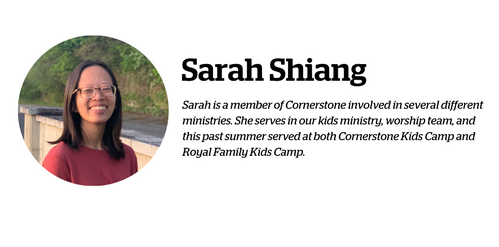Inviting Others Into God's Family

By Sarah Shiang
We typically think sharing the gospel has to be big, like preaching from a stage with the perfect words or hosting a large gathering at our homes. But often it starts small: through a casual conversation, a thoughtful question, or a simple invitation to join you at church.
This summer, I served as a counselor at Royal Family Kids Camp (RFKC), a weeklong sleepaway camp with foster youth. I told one of my campers that our lives are like the friendship bracelets we were making out of thread. Each knot is a memory, and each thread is a person or moment God weaves into our story. Every story points back to Him: our Rock through the storms, the Shepherd who looks for every lost sheep, and the loving God who pursues us with plans “to give you a future and a hope” (Jeremiah 29:11).
God delights to redeem even hidden, tangled parts of our lives, using them to make something beautiful, working them for His good purposes, just as Romans 8:28 promises. If God cares for the sparrows and clothes the lilies in splendor, how much more does He care for us? While each heart carries its own sorrow and joy that no one else can fully share (Proverbs 14:10), God knows our inner thoughts, the people He’s placed in our lives, and the number of hairs on our heads (Luke 12:6–7, 27).
When I got home, I shared about Royal Family Kids Camp with my coworkers, and with a childhood friend who had just moved back to California. To my surprise, my friend—whom I hadn’t seen since leaving for college—agreed to come to church with me the very next day. Pastor Matt’s sermon on the Two Debtors (Luke 7:36–50) sparked good conversations about community, love, and meaning. My friend had only ever been to a Catholic mass, and had not realized that Christianity isn’t about earning God’s approval by good works. Rather, it’s about grace, freely given.
Sharing the gospel often starts small, like with my friend. When people notice the joy and peace you have in your life that doesn’t seem to make sense in the midst of difficulty, it sparks curiosity. Our thoughts, words, and actions reflect the God who made us. He wants us to experience freedom from chasing the fleeting, empty promises of this world and instead abide in the freedom of His steady, abundant love. When people see that in our own lives, small conversations, questions, and invitations can make a big difference.
Only God can open hearts, but we can show up, be open, listen well, and invite others in. We can share honestly and point to a love like no other: unconditional, not earned. It’s too good to keep to ourselves.
Don’t wait for the “perfect” moment to share your faith. Just love people where they are. Pray for courage to push past the fear of not knowing exactly what to say, whether you’re in a coffee shop line, catching up with a coworker, grieving with a friend, or sitting down to share a meal with your family. As Pastor Matt wrote in an email to my childhood friend, Scripture promises that those who seek will find (Matthew 7:7). Just ask:
“My church is having a service this Sunday. Would you like to join me?”
This summer, I served as a counselor at Royal Family Kids Camp (RFKC), a weeklong sleepaway camp with foster youth. I told one of my campers that our lives are like the friendship bracelets we were making out of thread. Each knot is a memory, and each thread is a person or moment God weaves into our story. Every story points back to Him: our Rock through the storms, the Shepherd who looks for every lost sheep, and the loving God who pursues us with plans “to give you a future and a hope” (Jeremiah 29:11).
God delights to redeem even hidden, tangled parts of our lives, using them to make something beautiful, working them for His good purposes, just as Romans 8:28 promises. If God cares for the sparrows and clothes the lilies in splendor, how much more does He care for us? While each heart carries its own sorrow and joy that no one else can fully share (Proverbs 14:10), God knows our inner thoughts, the people He’s placed in our lives, and the number of hairs on our heads (Luke 12:6–7, 27).
When I got home, I shared about Royal Family Kids Camp with my coworkers, and with a childhood friend who had just moved back to California. To my surprise, my friend—whom I hadn’t seen since leaving for college—agreed to come to church with me the very next day. Pastor Matt’s sermon on the Two Debtors (Luke 7:36–50) sparked good conversations about community, love, and meaning. My friend had only ever been to a Catholic mass, and had not realized that Christianity isn’t about earning God’s approval by good works. Rather, it’s about grace, freely given.
Sharing the gospel often starts small, like with my friend. When people notice the joy and peace you have in your life that doesn’t seem to make sense in the midst of difficulty, it sparks curiosity. Our thoughts, words, and actions reflect the God who made us. He wants us to experience freedom from chasing the fleeting, empty promises of this world and instead abide in the freedom of His steady, abundant love. When people see that in our own lives, small conversations, questions, and invitations can make a big difference.
Only God can open hearts, but we can show up, be open, listen well, and invite others in. We can share honestly and point to a love like no other: unconditional, not earned. It’s too good to keep to ourselves.
Don’t wait for the “perfect” moment to share your faith. Just love people where they are. Pray for courage to push past the fear of not knowing exactly what to say, whether you’re in a coffee shop line, catching up with a coworker, grieving with a friend, or sitting down to share a meal with your family. As Pastor Matt wrote in an email to my childhood friend, Scripture promises that those who seek will find (Matthew 7:7). Just ask:
“My church is having a service this Sunday. Would you like to join me?”

